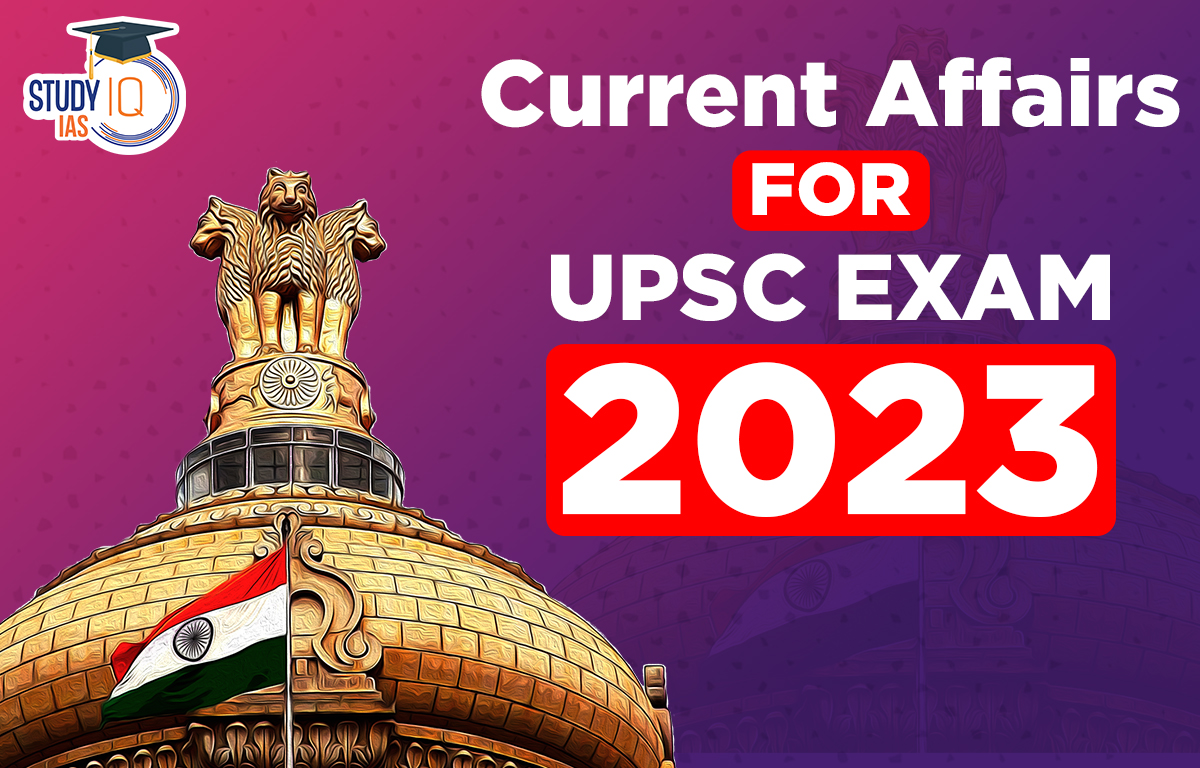Current Affairs 6th April 2023 for UPSC Prelims Exam
Central Information Commission
Context: The Central Information Commission (CIC) has overruled the decision of the Central Reserve Police Force (CRPF) claiming exemption from disclosure of information sought under the Right to Information (RTI) Act, 2005.
About Central Information Commission
- It is a statutory body established under the Right to Information Act, 2005.
- Section 12 and Section 15 of the RTI Act, 2005 deal with forming the Central Information Commission and State Information Commission.
Members of CIC
- It is made up of a Chief Information Commissioner and 10 Information Commissioners.
- The CIC members should be people of eminent personal life with a wide knowledge of laws, science and technology, social service, management, journalism, governance, etc.
- The President appoints the Central Information Commission on the committee’s recommendation, consisting of the Prime Minister as head, the opposition leader in Lok Sabha, and any cabinet ministers of the union nominated by the Prime Minister as members.
- The tenure of the Central Information Commissioner and Information Commissioners is decided by the central government or until they attain the age of 65 years, whichever is earlier.
- They are not eligible for reappointment.
Power of CIC:
- To receive and inquire into a complaint from any person regarding information requested under RTI Act, 2005.
- It can order an inquiry into any matter if there are reasonable grounds (suo-moto power).
- While inquiring, the Commission has the powers of a civil court in respect of summoning, requiring documents etc.
- It has control over all central government agencies.
Current Affairs 5th April 2023 for UPSC Prelims Exam
UN Statistical Commission
Context: India has been elected to the UN Statistical Commission for a four-year period.
About United Nations Statistical Commission
- It was established in 1947 as the highest body of the global statistical system, bringing together the Chief Statisticians from member states from around the world.
- It is the highest decision making body for international statistical activities, responsible for setting of statistical standards and the development of concepts and methods, including their implementation at the national and international level.
- Functions: The Statistical Commission oversees the work of the United Nations Statistics Division (UNSD), and it is a Functional Commission of the UN Economic and Social Council.
- Membership: The Commission consists of 24 member countries of the United Nations elected by the United Nations Economic and Social Council on the basis of an equitable geographical distribution according to the following pattern:
- Five members from African States;
- Four members from Asia-Pacific States;
- Four members from Eastern European States;
- Four members from Latin American and Caribbean States;
- Seven members from Western European and other States.
- The term of office of members is four years.
Parambikulam Tiger Reserve
Context: Kerala High Court has ordered to capture, radio-collar, and relocate an elephant to the Parambikulam Tiger Reserve.
About Parambikulam Tiger Reserve
- It is a protected area located in the Palakkad district of Kerala.
- It is one of the biodiversity hotspots of the Western Ghats and is known for its tropical and subtropical moist broadleaf forests.
- Fauna: The reserve is home to a diverse range of flora and fauna, including Bengal tigers, Indian elephants, sloth bears, Indian gaur, and several species of primates.
- Geographical features: The Anamalai Hills and Nelliampathy Hills are prominent ranges within the reserve.
- The highest peak in the reserve is Karimala Gopuram, which stands at an altitude of 1,443 meters.
- The reserve features several perennial rivers, including the Parambikulam, Sholayar, and Thekkady Rivers.
- The reservoir formed by the dam is an important source of water for the wildlife in the reserve.
- The reserve is home to several wetlands, including the Thoonakkadavu and Nedukkayam wetlands, which provide a habitat for a wide variety of water birds.
Privileges and Immunities Available to the Legislators
Context: The Supreme Court of India recently held that the political leaders are not entitled to “higher immunity” from investigation, arrest or prosecution.
What are Parliamentary Privileges?
- Parliamentary Privilege: Parliamentary privilege refers to rights and immunities enjoyed by Parliament as an institution and MPs in their individual capacity, without which they cannot discharge their functions as entrusted upon them by the Constitution.
- So far, neither Parliament nor any State legislature has enacted a legislation that defines the powers, privileges and immunities of the Houses, or that of its members and committees.
- These immunities are presently governed by British parliamentary conventions.
- Origination: The Government of India Act, 1935 first brought this provision to India, with references to the powers and privileges enjoyed by the House of Commons in Britain.
- Privileges under Art. 105: Article 105 of the Constitution deals with “powers, privileges of the Houses of Parliament and of the members and committees. Article 194 extends analogous protection to a member of the Legislature of every State.
- Freedom of Speech: Freedom of speech in Parliament is subject to the provisions of the Constitution and the rules regulating the procedure of the Houses.
- A member is exempt from legal action for anything said or vote given in Parliament or one of its committees.
- Article 121 of the Constitution restricts members from discussing the conduct of the judges of the Supreme Court and the High Court.
- Freedom from Arrest: A member has immunity from arrest and “service of legal process” within the precincts of the House without prior permission from the Chairman or Speaker.
- An MP can’t be arrested in a civil case, 40days before the commencement of the session or a committee meeting, and 40 days after its conclusion.
- However, this privilege is limited to civil cases.
- An MP doesn’t enjoy any immunity against action in a criminal case, during the session or otherwise.
- Parliament, however, reserves the right to receive immediate information of the arrest, detention, conviction, imprisonment and release of a member.
- Validity of any proceeding of Parliament can’t be inquired into by a court on the grounds of alleged irregularity of procedure, as per the provisions of Article 122.
- Right to Prohibit the Publication of Proceedings: No person shall be held liable for publishing any reports, discussions etc. of the House under the authority of the member of the house.
- Extension to Non-Members: Provisions that apply to MPs also extend to non-members (such as the Attorney General for India) those who have the right to speak and take part in proceedings or parliament committees, by virtue of the Constitution.
- Freedom of Speech: Freedom of speech in Parliament is subject to the provisions of the Constitution and the rules regulating the procedure of the Houses.
What is Breach of Privilege?
- If an individual or authority disregards or undermines a parliamentary privilege of a member or the House, it is called a ‘breach of privilege’. The offence is punishable.
- A member of the House can raise a question involving a breach of privilege with the consent of the Chairman or Speaker.
- Parliament is the sole authority to ascertain if there has been a breach of privilege or contempt of the House, no court is entrusted with this power.
- The authority to decide the punishment lies with the House. A person found guilty of breach of privileges or contempt can be reprimanded, warned or sent to prison.
- The period for which the House can commit an offender to custody or prison for contempt is limited to the duration of the session of the House.
- In case its member is found guilty, the MP can be suspended from the House or face expulsion.
Syndicated Loan
Context: Reliance Industries Ltd., and its telecom arm Jio Infocomm have raised a $5 billion in India’s largest syndicated loan.
About
- A syndicated loan, or a syndicated bank facility, is financing offered by a group of lenders—called a syndicate—who work together to provide funds for a borrower.
- The borrower can be a corporation, a large project, or a sovereign government.
- The loan can involve a fixed amount of funds, a credit line, or a combination of the two.
- Syndicated loans arise when a project requires too large a loan for a single lender or when a project needs a specialized lender with expertise in a specific asset class.
- Because they involve such large sums, syndicated loans are spread out among several financial institutions to mitigate the risk in case the borrower defaults.
- Interest rates on this type of loan can be fixed or floating, based on a benchmark rate such as the London Interbank Offered Rate (LIBOR).
- LIBOR is an average of the interest rates that major global banks borrow from each other.

Lumpy Skin Disease
Context: There has been stagnation in milk production and scarcity of ghee in India due to the prevalence of lumpy skin disease.
What is Lumpy Skin Disease?
- Viral Disease: Lumpy skin disease is caused by the lumpy skin disease virus (LSDV), which belongs to the genus capripoxvirus, a part of the poxviridae family (smallpox and monkeypox viruses are also a part of the same family).
- It is not a zoonotic virus, meaning the disease cannot spread to humans.
- Spread: It is a contagious vector-borne disease spread by vectors like mosquitoes, some biting flies, and ticks and usually affects host animals like cows and water buffaloes.

-
- LSD affects the lymph nodes of the infected animal, causing the nodes to enlarge and appear like lumps on the skin.
- The disease can either spread through direct contact with the vectors or through contaminated fodder and water.
- It can spread through animal semen during artificial insemination.
- Geographical Distribution: The disease was first observed in Zambia in 1929, subsequently spreading to West Asia, Southeastern Europe, and Central Asia, South Asia and China.
- Cure: Vaccinations and culling of infected animals.
- In India, ‘Goat Pox Vaccine’ is being used across affected States to contain the spread of LSD.

- Spread-control Measures:
- Vaccination of susceptible populations with more than 80% coverage
- Movement control of bovine animals and quarantining
- Implementing bio-security through vector control by sanitising sheds and spraying insecticides
- Strengthening active and passive surveillance
- Spreading awareness on risk mitigation among all stakeholders involved
- Creating large protection and surveillance zones and vaccination zones.
- Economic Implications:
- The disease leads to reduced milk production as the animal becomes weak and also loses appetite due to mouth ulceration.
- The income losses can also be due to poor growth, reduced draught power capacity and reproductive problems associated with abortions, infertility and lack of semen for artificial insemination.
- Movement and trade bans after infection also put an economic strain on the whole value chain.
- The disease also threatens the livelihoods of smaller poultry farmers significantly.
- Impact on India: India is the world’s largest milk producer at about 210 million tonnes annually.
- India also has the largest headcount of cattle and buffalo worldwide.
- The current outbreak in India has emerged as a challenge for the dairy sector.
- In Rajasthan, which is witnessing the worst impact of the lumpy skin disease, it has led to reduced milk production.
- Farmers in Uttar Pradesh and Punjab have incurred losses due to cattle deaths and are seeking compensation from their state governments.


 NDA Question Paper 2025, Download Mathem...
NDA Question Paper 2025, Download Mathem...
 Plastic Parks Scheme, Objective and Fina...
Plastic Parks Scheme, Objective and Fina...
 Vitamin D Deficiency: Causes, Symptoms a...
Vitamin D Deficiency: Causes, Symptoms a...





















